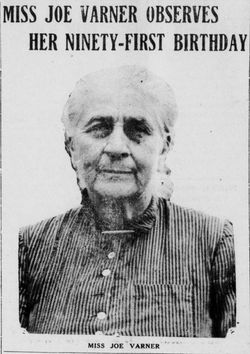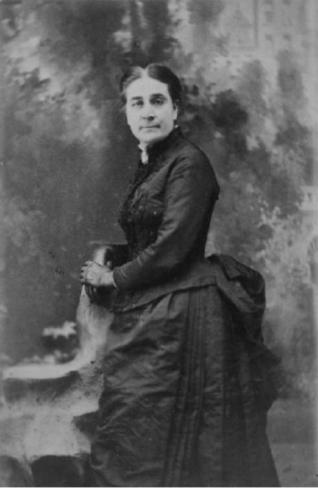

Queer Places:
Varner House or Indian Springs Hotel in Butts
County, Georgia
Indian Springs Cemetery
Butts County, Georgia, USA
 Narcissa Mary Josephine "Miss Joe" Varner (June 17, 1837 - November 12, 1928) was born in
Monticello, Jasper County, Georgia, the daughter of Edward Varner
(1790–1869) and
Cynthia Hardwick Fitzpatrick (1798–1882). In 1849,
Edward Varner and his sons purchased the Indian Springs Hotel in Butts County,
Georgia and later renamed it the Varner House. Indian Springs became a popular
health and social resort noted for the healing properties of the mineral water
of the spring. The hotel had been built by Creek Chief William McIntosh around
1823, and was the site of the signing of the Treaty of Indian Springs in 1825,
ceding all Creek Indian lands west of the Flint River to the State of Georgia.
The Varner children were educated at various schools in Georgia and
Tennessee. Daughters
Amanda and Josephine attended Eatonton Female Academy and LaGrange College and
sons Jefferson Monroe and Clinton L. attended East Tennessee University in
Knoxville. Josephine Varner taught school for several years, was well read,
and apparently had a clever way with words. For most of her life, however, she
worked with the management of the Varner House, where she was known to her
friends and hotel guests as "Miss Joe." Her brother John Clark and his wife
Addie taught in numerous schools near-Indian Springs. The Civil War was a
difficult period for the Varner family. Their eldest sons, Andrew Jackson and
Jefferson Monroe were both killed in 1862. Miss Joe's diary during this time
documents much sadness and disillusionment. After the war, the hotel continued
to attract many guests, but was run by Mrs. Varner and her daughters Miss
Amanda and Miss Joe. Mr. Varner had suffered much during the war and died in
1869 at the State Lunatic Asylum in Milledgeville, Georgia.
Narcissa Mary Josephine "Miss Joe" Varner (June 17, 1837 - November 12, 1928) was born in
Monticello, Jasper County, Georgia, the daughter of Edward Varner
(1790–1869) and
Cynthia Hardwick Fitzpatrick (1798–1882). In 1849,
Edward Varner and his sons purchased the Indian Springs Hotel in Butts County,
Georgia and later renamed it the Varner House. Indian Springs became a popular
health and social resort noted for the healing properties of the mineral water
of the spring. The hotel had been built by Creek Chief William McIntosh around
1823, and was the site of the signing of the Treaty of Indian Springs in 1825,
ceding all Creek Indian lands west of the Flint River to the State of Georgia.
The Varner children were educated at various schools in Georgia and
Tennessee. Daughters
Amanda and Josephine attended Eatonton Female Academy and LaGrange College and
sons Jefferson Monroe and Clinton L. attended East Tennessee University in
Knoxville. Josephine Varner taught school for several years, was well read,
and apparently had a clever way with words. For most of her life, however, she
worked with the management of the Varner House, where she was known to her
friends and hotel guests as "Miss Joe." Her brother John Clark and his wife
Addie taught in numerous schools near-Indian Springs. The Civil War was a
difficult period for the Varner family. Their eldest sons, Andrew Jackson and
Jefferson Monroe were both killed in 1862. Miss Joe's diary during this time
documents much sadness and disillusionment. After the war, the hotel continued
to attract many guests, but was run by Mrs. Varner and her daughters Miss
Amanda and Miss Joe. Mr. Varner had suffered much during the war and died in
1869 at the State Lunatic Asylum in Milledgeville, Georgia.

Josephine Varner as a young woman, Courtesy of Georgia Historical Society,
Savannah
Surviving letters between Alice Baldy and Josephine "Joe" Varner, suggest that southern women too formed romantic friendships, although these likely differed from those of women in the more urban and industrial region of the country. Baldy and Varner met in the 1850s at La Grange College (which they attended together with Miss Joe's only sister, Amanda.) Baldy, from a once-wealthy family that had run into hard times in the 1860s, scraped out a living as a teacher. She dreamed of running a school with Varner, but this was never to be. Baldy wrote Varner in 1870: “I am only a woman like yourself, yet you never had, & never can have a more devoted, sincere & constant lover than you have in me; and mine, my dear, is a love that will never tire. Do you know that if you only touch me, or speak to me there is not a nerve or fibre in my body that does not respond with a thrill of delight? . . . You remember the morning you came in the parlor . . . and, taking my head in your arms, you bent down with such a smile & such a look! and gave me the sweetest kiss any body could imagine I was quite happy." But perhaps because Varner did not reciprocate Baldy's love with the same intensity, the two women lived out their lives apart, Baldy struggling to make ends meet. Both women maintained close bonds with their families, but they also recognized the importance of friendship in their daily lives: "the love of my friends is a world of comfort to me," Joe confessed in her journal in December 1866. "Indeed I commit a daily sin in longing to see them and not being contended with my lot in life."' The dissatisfaction that bubbled underneath the surface of Miss Joe's diary entries reveals a latent frustration with not being able to do more in life, perhaps constrained by her gender. It was in this vein that Joe reflected in February 1867 how "friends make the charm of life to me," while admitting, "I have such rebellious feelings." Joe rarely vocalized these feelings of discontentment in public but buried them in her diary. It is feasible that she discussed such matters in her letters to Alice Baldy, but as the letters have been destroyed, it is difficult to say with any degree of certainly what secrets were hidden inside them.
My published books: